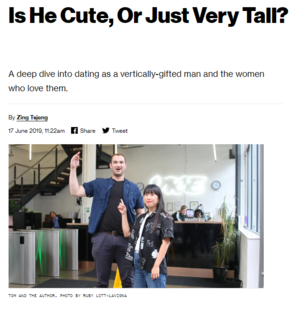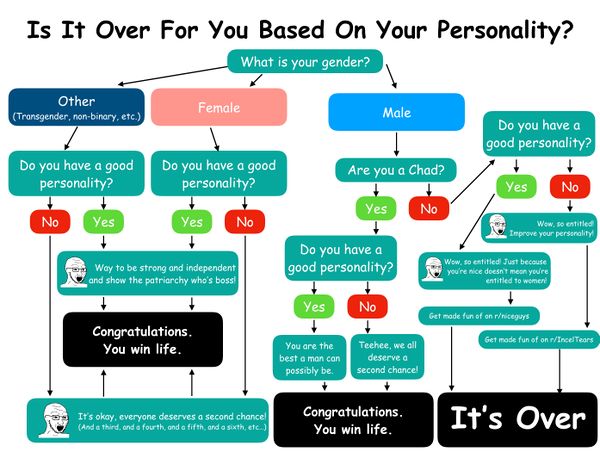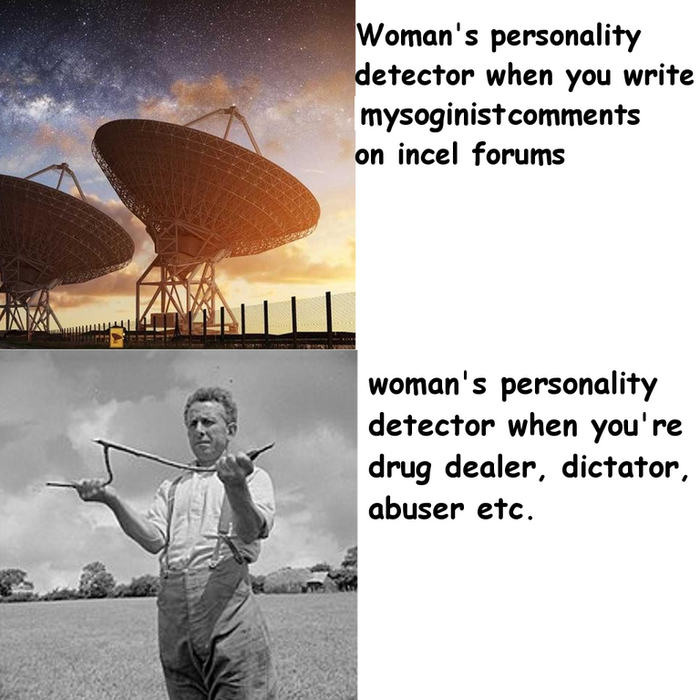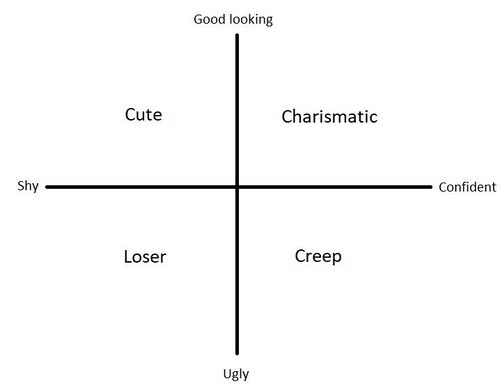Personality

Personality refers to relatively stable individual behavioral propensities, i.e. the phenomenon that people tend to predictably act in certain idiosyncratic manner. About 35%-60% of variation in personality traits is determined by genes, with some traits being more genetically heritable than others.[1] For many traits, the environmental causes are very unpredictable, almost random.[2] This is evidenced by adoptive, non-related children reared together being almost as different as two individuals randomly chosen from the population.[3] Such results suggest shared factors, that is factors explaining personality that are shared by siblings or twins like parenting style, social economic standing of the family, presence of environmental toxins, diet etc. to have a very minor effect on personality. This leaves the bulk of non-genetic variance in personality to be explained by nonshared factors like peers, imitation of role models, school environment, selective parenting styles, individual experiences, accidents and abuse, however, no reliable causal factors have been identified as of yet, and individual "traumatic" experiences likely also only play a minor role as they have a very minor effect on adult psychological functioning (see antifragility).
Physical attractiveness is slightly related to various positive personality traits like agreeableness (r < .11),[4] which has been suggested to be explained by good looking people being better treated and hence developing a more positive personality.[5] Social skills may be weakly (r = .23) linked to physical attractiveness for the same reason.[6] Perceived personality is strongly influenced by looks with good looking people being generally perceived to have a much better personality due to the halo effect.[7]
Personality and mating performance[edit | edit source]
Research shows that men with psychopathic traits (in laymen's terms called bad boys) are more attractive to women than those who don't.[8][9] However, it is unclear whether this is due to female choice or male intrasexual competition, mutual domination and intimidation.[10]
Overall evidence suggests, personality does not matter much for romantic attraction. Especially at low-acquaintance level, romantic interest is nearly entirely explained by looks, though looks also only weakly predict lifetime reproductive success (see Beauty).
Positive personality traits like mental stability, niceness and optimism are weakly linked to relationship stability,[11][12] but this is possibly explained by an underlying genetic life history speed factor, meaning a genetic fast-life strategy causes both relationship instability and mental/behavioral instability, rather than conscious effort regarding personality improving the relationship quality or mating success substantially. Romantic idealization is, for example, unrelated to long-term relationship stability (see romance). In summary, the bluepill trivializes dating difficulties by stating it is a matter of conscious choice and that it would have a great effect, which it hasn't. The blackpill overemphasizes the long-term significance of looks by extrapolating from short-term dating. Ultimately, neither looks, personality nor dominance matter particularly, while most of inceldom is likely explained by the extent to which there is pressure and opportunity to marry, as humans are likely substantially selected to accept their parent's mate choices (see mismatchcel).
How personality matters[edit | edit source]
The importance of personality can be easily assessed as follows:
Good personalities[edit | edit source]
Epithet chart[edit | edit source]
References[edit | edit source]
- ↑ https://www.researchgate.net/publication/276922271_Meta-analysis_of_the_heritability_of_human_traits_based_on_fifty_years_of_twin_studies
- ↑ https://www.coursera.org/lecture/behavioralgenetics/7a-shared-versus-non-shared-environment-distinction-Vjh21
- ↑ https://www.ncbi.nlm.nih.gov/pmc/articles/PMC3147063/pdf/dyq148.pdf
- ↑ Dunkel, C. S., Nedelec, J. L., van der Linden, D., & Marshall, R. L. (2016). Physical Attractiveness and the General Factor of Personality. Adaptive Human Behavior and Physiology, 3(3), 185–197. doi:10.1007/s40750-016-0055-7
- ↑ https://eric.ed.gov/?id=ED326784
- ↑ Ashmore, R. D., & Longo, L. C. (n.d.). Accuracy of stereotypes: What research on physical attractiveness can teach us. Stereotype Accuracy: Toward Appreciating Group Differences., 63–86. doi:10.1037/10495-003
- ↑ https://www.ncbi.nlm.nih.gov/pmc/articles/PMC4873083/
- ↑ https://bigthink.com/sex-relationships/dating-a-psychopath
- ↑ https://incels.wiki/w/Scientific_Blackpill#Personality
- ↑ https://incels.wiki/w/Scientific_Blackpill#Among_male_university_students.2C_only_cues_of_physical_dominance_over_other_men_predicted_their_mating_success
- ↑ https://www.sciencedirect.com/science/article/abs/pii/S0092656618301508?via%3Dihub
- ↑ https://www.researchgate.net/profile/Emily_Butler3/publication/6952141_Optimism_in_Close_Relationships_How_Seeing_Things_in_a_Positive_Light_Makes_Them_So/links/00b7d52b348893b037000000/Optimism-in-Close-Relationships-How-Seeing-Things-in-a-Positive-Light-Makes-Them-So.pdf
See also[edit | edit source]
Bluepill | |
| Articles |
Bluepill • Bluepillsplaining • Prove the Incel Wrong! • Cyanpill • Fakestream • Oofy doofy theory • Squirmy and Grubs • Confidence • Personality • PUA • Inceldom denialism • Broad-brusher • Individual solution reductionists |
|---|---|




